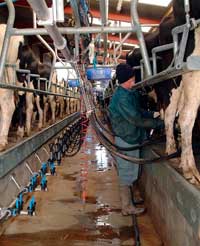Farmers ‘missing out on millions’ due to milk processor greed

The NFU has issued a stark warning to milk processors to stop profiting from better dairy commodity markets and increase farmgate milk prices immediately.
It estimates that the total value of UK dairy commodities is £0.5bn greater than the same time last year, yet only a tiny proportion of that has been passed back to farmers due to “greedy processors”.
“No buyer out there should be in a position not to announce a substantial price increase now,” dairy board chairman Mansel Raymond said.
In a special report sent to all major milk companies this week, the NFU said total revenues generated from cream were £34m higher in 2009 compared with 2008 and £36m more had been received so far this year compared with the same period in 2009. Cheese revenues had increased £13m in the last three months, £8m of which was in May alone, it said.
“Combining monthly wholesale prices with monthly utilisation volumes suggests that actual revenue to processors in May 2010 was £19m higher than in May 2009, equivalent to an increase of 4.3p/litre on last year,” Mr Raymond said.
“It’s down to individual processors as to how much of this they pass back to farmers, but farmers should be getting a big proportion of it. The increases of 0.25-0.5p/litre we’ve seen so far are simply not enough.”
He urged farmers and their representatives to push milk buyers and ask why prices weren’t coming through. “We always seem to have to wait longer for price increases compared with when the market goes the other way.”
Mr Raymond said farmer-owned co-ops close to manufacturing markets should lead the price increases. “At the end of the day, they’re the ones with the most milk. All dairy companies have to look after their shareholders, but in the case of co-ops, farmers are the shareholders and they should be getting the best possible return for their milk.”
Those on dedicated supply contracts with supermarkets had fared better and continued to top milk price league tables, while “warfare” in the middle ground liquid market was unnecessarily demeaning the value of milk, he added. “Middle ground customers who often receive dairy products at a cheaper price should be the first to be asked to pay up when markets strengthen.”
The NFU offered six key reasons why milk prices had not risen in line with farmer expectations:
1. Time lags caused by processors operating on forward markets rather than spot prices
2. Processor costs such as fuel, packaging and containers have increased
3. Competition for milk between buyers may make companies reluctant to raise prices
4. Some buyers believe higher commodity returns will be short-lived
5. Many companies put owners and shareholders first in rising markets
6. Milk buyers often only pay the minimum price necessary to secure milk supplies
